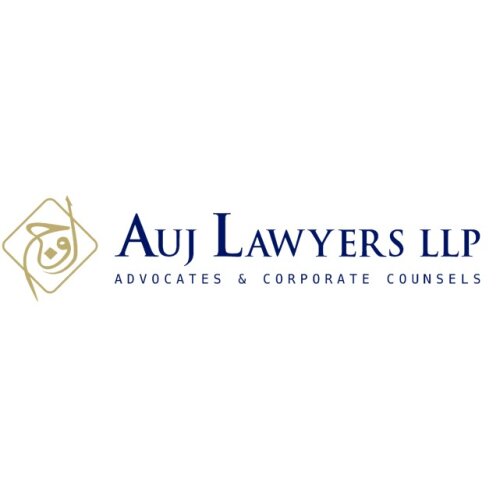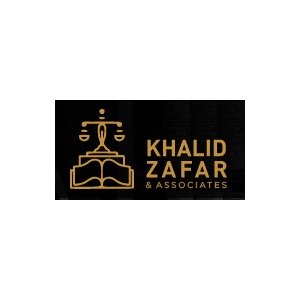Best Structured Finance Lawyers in Lahore
Share your needs with us, get contacted by law firms.
Free. Takes 2 min.
List of the best lawyers in Lahore, Pakistan
About Structured Finance Law in Lahore, Pakistan
Structured Finance refers to complex financial transactions that go beyond simple loans or credit extensions. In Lahore, Pakistan, Structured Finance typically involves pooling financial assets, such as mortgages, loans, or receivables, and then repackaging them into securities that can be sold to investors. These transactions often utilize instruments like securitizations, asset-backed securities (ABS), collateralized loan obligations (CLOs), and other sophisticated debt structures. Structured Finance is crucial for corporations, banks, and other institutions seeking to manage risk, optimize funding, or unlock liquidity from their asset portfolios.
Why You May Need a Lawyer
There are several scenarios in which individuals or companies may require legal assistance regarding Structured Finance in Lahore:
- Advising or structuring new financial instruments or products for your business
- Drafting, reviewing, or negotiating complex Structured Finance agreements and documentation
- Ensuring compliance with local securities and banking regulations set by authorities like the State Bank of Pakistan and the Securities and Exchange Commission of Pakistan (SECP)
- Managing risks associated with asset securitization or loan restructuring
- Dispute resolution arising from Structured Finance transactions or breached agreements
- Facilitating mergers, acquisitions, or divestitures involving structured debt
- Representing you in regulatory proceedings or investigations related to financial law
- Conducting due diligence for potential investment in complex financial instruments
In each of these cases, the expertise of a lawyer skilled in Structured Finance ensures your interests are protected and all actions conform to the relevant legal framework.
Local Laws Overview
Pakistan’s legal framework for Structured Finance in Lahore is shaped by both federal and provincial statutes, as well as regulations issued by key regulatory bodies:
- The Companies Act, 2017 sets out the corporate structure and governance aspects relevant to financiers and issuers.
- The Securities Act, 2015 and SECP rules govern securities offerings, asset-backed securities, and disclosure requirements for Structured Finance.
- The State Bank of Pakistan’s Prudential Regulations outline rules for banks engaging in structured and complex financing, including capital adequacy and risk management.
- The Trust Act, 1882 and Contract Act, 1872 pertain to the legal enforceability of trusts and commercial agreements essential to Structured Finance deals.
- Legal provisions against anti-money laundering and combating the financing of terrorism also have significant implications for structured transactions.
It is important to remember that the regulatory landscape for Structured Finance is continually evolving, especially with increasing international scrutiny and local market development.
Frequently Asked Questions
What is Structured Finance and how does it differ from traditional finance?
Structured Finance involves complex financial arrangements that bundle and redistribute risk, unlike traditional finance which typically deals with straightforward loans or bonds. Structured Finance uses instruments like asset-backed securities and securitizations to create more flexible funding solutions.
Is Structured Finance regulated in Lahore, Pakistan?
Yes, Structured Finance is subject to multiple layers of regulation by the Securities and Exchange Commission of Pakistan, the State Bank of Pakistan, and existing legal statutes related to companies, contracts, and trusts.
Who typically uses Structured Finance products?
Corporate borrowers, banks, non-bank financial institutions, large commercial enterprises, and occasionally government entities use Structured Finance products to optimize capital structure, access funding, or manage balance sheet risks.
How does securitization work in Pakistan?
Securitization in Pakistan involves pooling similar financial assets (like loans or receivables), transferring them to a Special Purpose Vehicle (SPV), and issuing securities backed by those pooled assets to investors, in accordance with SECP regulations.
What are the legal risks in Structured Finance transactions?
Common legal risks include defaults, breaches of contract, regulatory non-compliance, uncertain enforceability of security interests, and vulnerability to changes in laws or regulations.
Can foreign investors participate in Structured Finance deals in Lahore?
Yes, subject to foreign exchange regulations and SECP guidelines, foreign investors can participate in Structured Finance transactions, although additional approvals may be required.
What documentation is needed for a Structured Finance deal?
Key documents may include loan agreements, trust deeds, offering circulars, legal opinions, disclosure documents, security documentation, and compliance certificates.
Are Islamic Structured Finance products available in Lahore?
Yes, Shariah-compliant or Islamic Structured Finance products such as sukuk are available, governed by both SECP’s Islamic finance regulations and Fatwa or Shariah Board approvals.
How can disputes in Structured Finance transactions be resolved?
Disputes can be resolved through negotiation, mediation, arbitration, or litigation in local courts, depending on the dispute resolution clause in the agreements and the nature of the dispute.
What should I consider when choosing a lawyer for Structured Finance in Lahore?
Seek a lawyer experienced in financial law, familiar with Pakistan’s relevant regulations, having a strong track record with Structured Finance products, and able to provide clear communication and practical solutions.
Additional Resources
If you are seeking further information or assistance on Structured Finance in Lahore, these organizations and resources may be helpful:
- Securities and Exchange Commission of Pakistan (SECP) - Regulator for securities, asset-backed securities, and Islamic finance
- State Bank of Pakistan (SBP) - Central bank overseeing financial sector regulations
- Pakistan Stock Exchange (PSX) - Resource for listed structured products and market data
- Lahore High Court - For legal precedents or directions on finance-related litigation
- PBC (Pakistan Bar Council) - Directory for qualified financial lawyers in Lahore
- Pakistan Institute of Corporate Governance - For best practices and seminars on corporate and financial governance
Next Steps
If you require legal advice or assistance in Structured Finance matters in Lahore, consider the following steps:
- Identify and clearly define the scope of the Structured Finance issue or transaction you are dealing with
- Gather all related documentation and factual background information
- Research and shortlist lawyers or law firms in Lahore with experience in Structured Finance and banking law
- Arrange an initial consultation to discuss your needs and evaluate the lawyer’s approach
- Discuss fee structures, expected timelines, and communication preferences with your chosen legal professional
- Stay informed and involved throughout the process, ensuring you receive updates and explanations at each stage
By following these steps and drawing on relevant local expertise, you can navigate Structured Finance issues in Lahore successfully while protecting your financial and legal interests.
Lawzana helps you find the best lawyers and law firms in Lahore through a curated and pre-screened list of qualified legal professionals. Our platform offers rankings and detailed profiles of attorneys and law firms, allowing you to compare based on practice areas, including Structured Finance, experience, and client feedback.
Each profile includes a description of the firm's areas of practice, client reviews, team members and partners, year of establishment, spoken languages, office locations, contact information, social media presence, and any published articles or resources. Most firms on our platform speak English and are experienced in both local and international legal matters.
Get a quote from top-rated law firms in Lahore, Pakistan — quickly, securely, and without unnecessary hassle.
Disclaimer:
The information provided on this page is for general informational purposes only and does not constitute legal advice. While we strive to ensure the accuracy and relevance of the content, legal information may change over time, and interpretations of the law can vary. You should always consult with a qualified legal professional for advice specific to your situation.
We disclaim all liability for actions taken or not taken based on the content of this page. If you believe any information is incorrect or outdated, please contact us, and we will review and update it where appropriate.

















